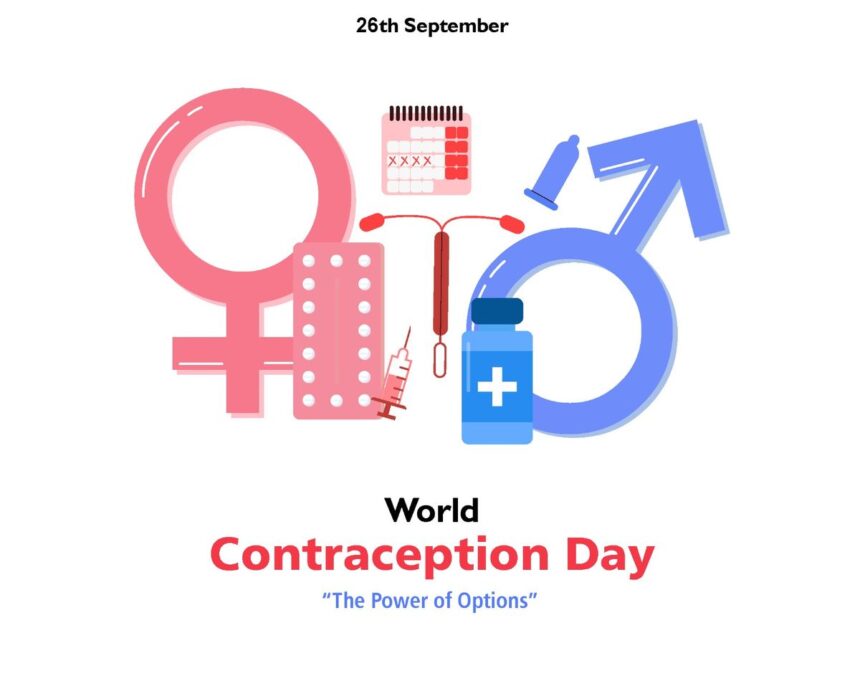🧬 Introduction: Why World Contraception Day Deserves Attention
In a world with rising population concerns, reproductive health disparities, and limited access to family planning services, World Contraception Day, observed on September 26 every year, plays a vital role in educating people about their reproductive choices.
- 🕰️ Timeline of World Contraception Day
- 📜 History of World Contraception Day
- 💡 9 Eye-Opening Facts About World Contraception Day
- 1. 🎯 Contraception Reduces Maternal Deaths
- 2. 📊 Over 270 Million Women Still Lack Access
- 3. 🧠 It’s Not Just About Pregnancy
- 4. 👩⚕️ Youth Are a Primary Focus
- 5. 🗓 Timing Saves Futures
- 6. 🌍 Globally Observed in 70+ Countries
- 7. 💊 Multiple Methods Exist
- 8. 📱 Digital Contraception Tools Are Booming
- 9. 🗣 It Fights Social Stigma
- ❓ Frequently Asked Questions (FAQs)
- 🎯 Importance of World Contraception Day in Modern Life
- 🎉 How Is World Contraception Day Observed?
- 🏫 In Schools and Colleges:
- 📱 On Social Media:
- 🏥 In Clinics and Hospitals:
- 🧑⚕️ Community and NGO Initiatives:
- 🙏 Thoughtful Wishes for World Contraception Day
- 📌 Key Takeaways
- 🧠 Conclusion: Contraception is Empowerment
This day isn’t just about preventing pregnancy — it’s about empowering individuals, reducing poverty, improving maternal health, and promoting gender equality. It’s a reminder that informed choices about contraception are fundamental rights, not privileges.
🕰️ Timeline of World Contraception Day
| Year | Milestone |
|---|---|
| 2007 | World Contraception Day was first launched by the European Society of Contraception and other partners. |
| 2012 | The campaign expanded to reach over 70 countries worldwide. |
| 2015 | The theme “Your Life, Your Voice” emphasized youth engagement and online resources. |
| 2020 | Digital campaigns during COVID-19 emphasized remote health access. |
| 2023 | Focused on rights-based contraceptive education and eliminating stigma globally. |
📜 History of World Contraception Day
World Contraception Day (WCD) was established in 2007 with the goal of improving awareness about contraception and helping people make informed choices about reproductive health. It is supported by a global coalition of NGOs, governments, healthcare agencies, and international organizations.
The focus has been particularly strong on youth and women in low- and middle-income countries, where access to reproductive health services is often restricted or taboo.
The founding partners include:
European Society of Contraception
International Planned Parenthood Federation (IPPF)
Bayer HealthCare
Marie Stopes International
Family Planning Association
💡 9 Eye-Opening Facts About World Contraception Day
1. 🎯 Contraception Reduces Maternal Deaths
Access to modern contraception could prevent up to one-third of all maternal deaths worldwide. It allows spacing of pregnancies, reducing health risks.
2. 📊 Over 270 Million Women Still Lack Access
Despite progress, more than 270 million women of reproductive age in developing regions have unmet needs for family planning.
3. 🧠 It’s Not Just About Pregnancy
Contraception supports education, economic stability, and gender equality, enabling women to plan their futures.
4. 👩⚕️ Youth Are a Primary Focus
Most sexually active adolescents lack comprehensive sexual education. World Contraception Day helps bridge that knowledge gap.
5. 🗓 Timing Saves Futures
Proper use of contraception helps in birth spacing, reducing risks for both mother and baby, and improving child development outcomes.
6. 🌍 Globally Observed in 70+ Countries
The awareness campaign reaches millions worldwide via workshops, media, clinics, and digital education programs.
7. 💊 Multiple Methods Exist
From condoms to IUDs, implants to pills, contraception today offers diverse, safe, and personalized options for individuals.
8. 📱 Digital Contraception Tools Are Booming
Online consultations, mobile apps, and telehealth have made contraceptive advice more accessible than ever before.
9. 🗣 It Fights Social Stigma
This day also works to break taboos around sex, contraception, and reproductive rights — especially in patriarchal societies.
❓ Frequently Asked Questions (FAQs)
Q1. When is World Contraception Day observed?
→ On September 26 every year.
Q2. What is the goal of World Contraception Day?
→ To raise awareness about the importance of access to contraception and informed reproductive health decisions.
Q3. Who supports World Contraception Day?
→ NGOs, global health organizations like WHO and UNFPA, national governments, educational institutions, and medical professionals.
Q4. Why is youth education important on this day?
→ Because adolescents are the most vulnerable to misinformation, peer pressure, and unintended pregnancies.
Q5. What are some safe methods of contraception?
→ Condoms, oral contraceptives, intrauterine devices (IUDs), implants, patches, diaphragms, sterilization, and fertility awareness methods.
🎯 Importance of World Contraception Day in Modern Life
World Contraception Day addresses several real-world challenges that impact our daily lives:
🌱 Population Control: Helps manage family size, thus easing pressure on limited global resources.
👩🎓 Educational Empowerment: Girls who delay early pregnancies are more likely to complete their education.
💰 Economic Mobility: Planned families can better allocate resources and improve overall well-being.
❤️ Health & Wellness: Reduces unwanted pregnancies, abortions, and sexually transmitted infections (STIs).
👫 Relationship Clarity: Encourages open conversations about intimacy, consent, and trust.
🔄 Global Development Goals: Aligns with UN Sustainable Development Goals (SDGs), especially Goal 3 (Good Health) and Goal 5 (Gender Equality).
🎉 How Is World Contraception Day Observed?
🏫 In Schools and Colleges:
Awareness sessions
Poster-making competitions
Sexual health education drives
📱 On Social Media:
Campaigns like #YourLife and #ContraceptionMatters
Influencer engagement and quizzes
YouTube videos, reels, and infographics
🏥 In Clinics and Hospitals:
Free contraceptive counseling
Access to various contraceptive devices
Confidential Q&A sessions with OB-GYNs
🧑⚕️ Community and NGO Initiatives:
Rural outreach programs
Male participation drives
Safe sex awareness among marginalized communities
🙏 Thoughtful Wishes for World Contraception Day
“A healthy future starts with informed choices. Happy World Contraception Day!”
“Empower your life, your body, and your choices — celebrate reproductive freedom.”
“Breaking taboos, one fact at a time. Let’s normalize contraception.”
“Every person deserves access to safe contraceptive methods. Today, we raise that voice.”
“Educate, empower, and elevate — this World Contraception Day, be the change.”
📌 Key Takeaways
📅 Observed On: 26th September
🎯 Goal: Spread awareness about safe contraception and reproductive choices
🏥 Led By: NGOs, healthcare orgs, governments
🧠 Focus: Youth, women, low-income communities
🌐 Global Participation: 70+ countries
📣 Primary Message: “It’s Your Life, It’s Your Responsibility”
🧠 Conclusion: Contraception is Empowerment
World Contraception Day is more than an awareness campaign — it’s a movement for informed living, healthy relationships, and gender equality.
In a world where myths still control millions of minds, education and access are power. Whether you’re a parent, student, teacher, or policymaker, your participation in spreading contraceptive awareness can change — or even save lives.
Let us pledge to make safe sex and reproductive health an open, stigma-free conversation. Because every individual deserves the right to choose when and if they want to have children.
🩺 Happy World Contraception Day!
Let’s protect the future, one informed choice at a time.








